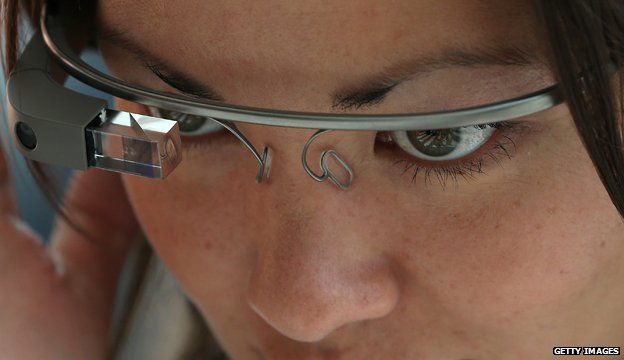Disability technology: Is the future already here?
- Published

Technology has long been heralded as a solution to the many difficulties experienced by disabled people. So how can it help?
In the last 10 years, focus has shifted from desktop PCs to mobile devices. Today's smartphones are mini-computers with an increasing range of features for disabled people - they talk, hook up to hearing aids and have other ingenious accessibility functions.
But when we're not using them in our hands, they idle in our pockets. Through miniaturisation, however, mobile devices could now work for us all day long - by perching on our faces in the form of "smart" glasses.
Robin Christopherson of the charity AbilityNet is blind and an adisability tech enthusiast. He believes that smart spectacles like the forthcoming Google Glass - hands-free, perched at ear, eye and mouth level, and with the power of a mobile phone - hold real promise for disabled people.
"On my phone I've got an app called talking goggles, which performs real-time object recognition," says Christopherson. He is looking forward to a time when this functionality could be constantly working for him in the form of smart glasses.
Speaking on this month's Ouch talk show, Christopherson lists how these devices could help people with a range of impairments.
Facial recognition software in glasses could identify how the person in front of you is feeling and flash up captions which say "happy", "sad" or "upset". This could be helpful for someone who can't determine emotions in others - such as people with Asperger's Syndrome. Deaf people could enjoy real-time subtitles so they can see what people are saying to them - as they can with television subtitles.
Mobile phones and glasses are everyday mass-produced technologies and are more likely to be adopted than the more experimental and expensive devices made especially for the disabled market.
In other headlines, we often hear of paralysed people who control computers with their minds. This doesn't just open up the world of email and word processing but could help control prosthetic limbs. Christopherson calls this technology "mature", but you can't just pick it up and go by donning face-wear.
AbilityNet's Robin Christopherson talks about future disability tech.
"The most successful interface at the moment is an invasive one, where you undergo surgery and have things implanted in your brain," he says. "This is a very accurate technique. You can see videos (on the internet) of people who have had this procedure, with a robotic arm, drinking their cup of coffee."
He says this technology is somewhere between months and years away and AbilityNet is working with a European project called BrainAble focusing on this area.
His focus stretches to another technology high on many disabled people's shopping lists - driverless cars. Christopherson thinks these are "just a couple of years away" at the minimum and are likely to cost about £5,000-£10,000 more than a regular family car.
But there is a worry in the disability community that even when the technology arrives, lawmakers and the public may not allow disabled people to "drive" such cars if they are unable to over-ride them in an emergency - potentially excluding people with visual impairments or motor function difficulties, for instance.
Christopherson thinks acceptance of computer-driven cars will take time but is quietly confident the trust will build.
"Google Ventures - venture capitalists - have put in $258m to purchase 25,000 autonomous taxis," says Christopherson. The vehicles are for use by international cab company Uber, he says, "specifically so that they won't have to pay taxi drivers".
And though it might feel socially problematic to allow a disabled person to use a car he or she can't control, he points out that smart taxis could shake up the discussion in a different way as they will sometimes be "toddling around without anybody in them when they go to pick up their fare".
So in the future we could have empty cars run by a computer, or cars with a disabled driver unable to over-ride the computer. Is there a difference, and which would you prefer?
Additional reporting by Damon Rose.
Listen to the full talk show for November which includes a longer version of the discussion with Robin Christopherson, an interview with mental health video blogger Jonny Benjamin, disabled comedian Tim Renkow, The Fish Police and more. It's available as a download or you can stream it in top quality via Audioboo. Read more details about the show here.
Follow @BBCOuch on Twitter and on Facebook, and listen to our monthly talk show